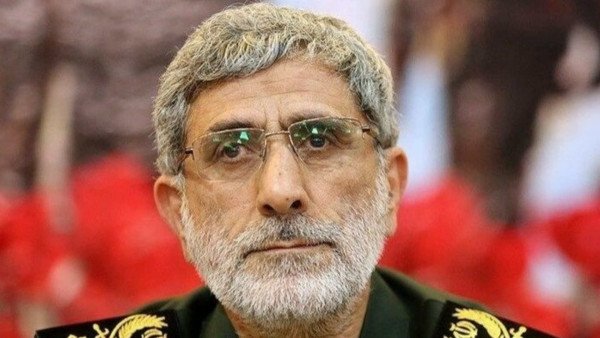IRGC commander Qaani in Baghdad to push U.S. withdrawal, resolve inter-Shiite political disputes
IRGC commander Qaani in Baghdad to push U.S. withdrawal, resolve inter-Shiite political disputes
Qaani’s visit comes amid an ongoing political crisis, following last month’s revelation of a “wiretapping network” inside the prime minister’s office
Baghdad – Mohammed Imad — General Esmail Qaani, commander of the Quds Force in Iran’s Revolutionary Guard Corps, made an unannounced visit to Baghdad on Tuesday, where he held meetings with political leaders from the Coordination Framework political bloc, as well as leaders of several Iranian-backed Iraqi armed factions.
Qaani’s visit comes amid an ongoing political crisis, following last month’s revelation of an alleged “wiretapping network” inside the prime minister’s office, and continued escalations by leaders of the ruling Coordination Framework. Notable figures involved in the escalation include Nouri al-Maliki, head of the State of Law Coalition, and Qais al-Khazali, leader of Asa’ib Ahl al-Haq, who have both been lashing out against Iraqi Prime Minister Mohammed Shia al-Sudani.
According to informed Iraqi sources in Baghdad, who spoke to Al-Araby Al-Jadeed, The New Arab’s sister publication, “Qaani arrived in Baghdad on Monday evening on an unannounced visit. During his stay, he held several meetings with leaders of the Coordination Framework and certain Iraqi armed factions, discussing the need to contain the current crisis and halt the media escalation against Sudani and his government.”
The sources added that Qaani conveyed Tehran’s position during the meetings, emphasizing the importance of containing the crisis and ending the escalation against Sudani and his government.
Qaani also discussed the issue of the U.S. troop withdrawal during the meetings, stressing the need for a clear and public timetable for the withdrawal. He underscored that the U.S. military presence near Iran poses a threat to Iranian national security.
Tehran has been exerting pressure on Baghdad for some time to end the role of the international coalition and secure the withdrawal of U.S. forces from Iraq—one of the key issues for Iran concerning its relations with Iraq.
Political analyst Mohammed Ali al-Hakim told Al-Araby Al-Jadeed that Qaani’s visit to Baghdad at this particular time, amid a major and undisclosed political crisis, indicates that the conflict between certain factions within the Coordination Framework and Prime Minister Sudani has reached a dangerous stage. He added that it is customary for Iran to intervene to regulate the internal dynamics of the Shiite political scene whenever tensions arise.
Al-Hakim noted that the conflict between factions in the Coordination Framework and Sudani had escalated to critical levels, with threats of Sudani’s dismissal and the possibility of early parliamentary elections becoming realistic options. This follows the revelation that the wiretapping network primarily targeted leaders within the Framework and armed factions, deepening their disputes with Sudani.
He added that, following Qaani’s intervention to de-escalate tensions against Sudani and his government, there may be a noticeable shift towards calm and a reduction in media tensions in the coming days.
Iraq’s political landscape has entered an unprecedented state of tension since the U.S. invasion in 2003. The ruling Coordination Framework, made up of Arab Shiite political forces with close ties to Tehran, is now experiencing internal disputes stemming from a trust crisis among its members. These tensions have been exacerbated by the recent revelation of a “spy cell” involving employees in the prime minister’s office, which carried out wiretapping operations targeting officials, judges, and parliament members. The judiciary has been investigating the matter for several weeks.
Sudani’s government, formed in October 2022 with the support of the “State Administration Coalition,” includes all the traditional political parties except for the Sadrist Movement (now called the National Shiite Movement). Sudani has committed to an “evaluation” policy as part of his government program, which requires ministerial performance reviews within six months. He has begun to act on this, as seen in the case of the governor of Qadisiyah, who was replaced despite the new governor being from the same party. This decision has raised questions among activists.
The current government consists of 23 ministries, distributed among Sunni, Shiite, and Kurdish political parties, as well as minority groups, following the “quota” system based on electoral entitlement. Observers have described this system as “consensual.” The government was approved by the Iraqi parliament in October without significant disputes among the political parties.

